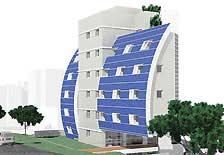Green building was once regarded as a fringe concept in Israel, but now that Intel is devoting funds to a green structure in Haifa, the idea seems to be taking off. The main challenge for sustainable architects is finding developers who will invest in their projects, since conventional building is much more common, and therefore cheaper.
Architect Joseph Cory of the sustainable architecture company Geotectura has been lucky: Haifa developers Yaniv and Yair Reif are funding his latest project, an apartment complex in the city that Cory has named the SunSail. And the developers are doing more than putting their money where their mouth is - one of them intends to live in the building after it's completed.
The SunSail project is scheduled to be completed in two or three years (pending approval from the Haifa Municipality) and will consist of 11 apartments. The building is designed with a curved façade almost entirely covered with solar panels, which will provide up to 40 percent of the residents' electricity. A passive ventilation system will allow breezes to flow in during the warmer months, possibly minimizing the need for energy-guzzling air conditioning.
While the building technically has space for a twelfth apartment on the ground floor, Cory opted to leave that space open, leading out into a garden behind the building. The idea is that the garden will grow partway into the building, minimizing the building's ecological "footprint."
Water, always a major issue in Israel, is another central element of the design. Rainwater collectors on the roof and basement will take advantage of precipitation, while wastewater from baths and sinks will be purified in the building's own water purification system.
Cory observes that contrary to a common misconception, sustainable architecture is not entirely concerned with ecology. In building this complex, Cory says, he "tried to deal with many aspects - not just ecological, but also social, technological, and economical, to make this building accessible for people who want to live in it."
Quality of life for the building's inhabitants is as high a priority for Cory as ecological soundness. SunSail's chosen site will allow exposure to the sun, providing both warmth in the winter and natural light, the latter of which has proven psychological benefits.
But during the summers, the side of the building that is exposed to the sun will be covered with what Cory calls a "vertical garden" - a proliferation of greenery that will cover the windows and provide shade. The leaves on these plants will wither away in the wintertime, so that the sunlight can enter and provide additional heat.
The idea of carefully choosing the site for a construction project and considering the future lifestyle of the building's inhabitants is still novel to most builders in Israel, according to Cory. "Usually, builders aren't aware of environment," says Cory. "They just put a building on the site, and then they complain that they have to pay so much to make the house warm or to cool it in summer." In contrast, Cory adds, "Sustainable design is all about thinking in advance in order to save a lot of money later on."
One way in which residents of the SunSail can save money is the significant reduction to their electricity and water expenses, since the building will produce some of its own energy and collect rainwater runoff.

